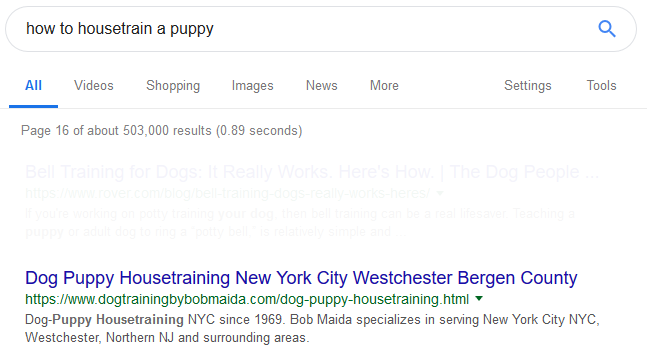Let’s be honest with each other. SEO is important, even though it can feel overwhelming and confusing. And while sometimes people think it’s all just made up, search engine optimization is, in fact, very real.
But if you take a step back for a moment, you’ll see that the very same things that are important in SEO, quite simply, are the same things that are important to your users. Rather than doing things for the sole purpose of making the search engines happy, shift your focus to the intended audience of your content. If you build out your content in a way that makes it interesting and easily accessible to your users, it will naturally result in your site being found in search results.
Do things that make sense for users, not just SEO
Don’t get me wrong, I understand the importance of getting indexed in search engines, especially Google, but writing with the intent to rank high in search results really isn’t the right motivation.
When I train specialists on SEO here at TKG, the biggest message I convey to them is to think first about the users. If we do things that that help people get answers to their questions or get work done, we will perform well from an SEO perspective.
Prioritizing users above search engines helps increase your chances of earning a top ranking and with a top ranking comes increased traffic and visibility. How? Well, every search that is performed has a specific intent whether it is to find, learn, fix, buy or solve and we are judged on how well we satisfy these searches.
There are three types of search queries that users generally make:
- Transactional: the user wants to do something
- Navigational: the user wants to go to a particular page
- Informational: the user wants to know something
As I mentioned, our job as marketers is to figure out if our sites meet the specific search intent of the user: Do we have clear content? Is the site easy to navigate? Is the site fast? These are the questions that affect search rankings more than anything else. If you don’t please the people search engines are sending your way with relevant and useful content, your website will rank lower and receive less traffic.
The key question you have to ask yourself is: What does the user want? This will help ensure you are writing for users and not search engines.
Let’s use page titles, for example. If they’re written only for search engines to process, they are full of keywords, but mean nothing to the user viewing the search results. If we wrote them for users they’d be more readable, naturally have the keywords and both parties would be happy.
The best page titles are the ones that both introduce the topic and make your audience feel like it will make their lives better or easier. These types of titles are good for SEO because they speak directly to the search queries of your customers. For example, I searched for how to housetrain a puppy and received these two results as options to view. Which would you choose?
Option 1

Option 2

The first option tells me exactly what I am going to get. I am going to read a comprehensive guide on how to successfully potty train my dog. The second option is littered with random key words and fails to tell me what I am going to really read about. The page title wasn’t written for the end user, but was rather written with search engines in mind.
To further prove my point: The first article, with the page title written for the user, appeared at the top of my search while the second was buried deep in Google’s search results.
Once you’ve clicked on a link, then what about page headlines? A properly formatted page with an h1-tagged headline signals the specific content on the page for a search engine. I performed my own informational query and again searched how to house train a puppy. The first option is great: The clearly marked h1 tag tells me (and the search engine) exactly what content will be found on the page, and it clearly aligns with my search. But, the second option is, once again, buried deep in Google’s pages and doesn't clearly define what the content is and how it relates to my search.


Taking it a step further with site speed: We know we need things to be fast because search engines say it’s a ranking factor, but aren’t our users looking for information quickly as well? If you don’t serve the information fast, it doesn’t matter how great the content is. Users are impatient, and your site will be docked in SEO rankings accordingly.
Don't overcomplicate things
Are you starting to see my point? Everything we do should be motivated by the effect that it has on your users. And, it just so happens that what's good for users is good for search engine optimization. This doesn’t mean there still aren’t a lot of technical SEO things that need done that maybe a user doesn’t see. But, if you’re just starting out, why complicate things?
A final reminder
A final reminder before I send you off into the SEO abyss: You may hear your digital team say they're doing SEO or doing something to improve your performance, but if it's not motivated by what's good for users, it's not good for your site.
Ready to kick your SEO strategy into high gear? Contact us to get started!



